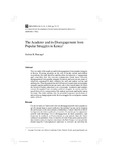| dc.description.abstract | In this article, the academy refers generally to tertiary institutions of learning
including universities and polytechnics. But given the history of political engagements
between tertiary education institutions and the state in Kenya, the
study zeroes more specifically on the story of universities as sites of political
and popular struggle. The trajectory of engagement described here has a clear
pattern that has tended more towards disengagement from popular struggles
in the last three decades. The pattern has moved from active participation in
popular struggles against authoritarian one-party rule to the current phase in
which the terrain of higher education is at a crossroads and academics and
students remain disengaged from everyday political struggles in society. The
possibilities of a re-composition of the student movement and faculty union
are many. I describe the history and dynamics involved in this process and
explain why the potential for greater involvement of universities as change
agents in the diverse struggles for social justice remain underutilised.
Student politics and struggles are organised around associations while faculty
have coalesced around staff unions. These are new or resuscitated organizations
and do not seem to anchor their pursuits in any popular struggles. In fact, they
seem disengaged from these struggles and are unable internally to defend and
enjoy the democratic gains evident in the larger Kenyan society. The associations
and unions lack a serious ideological base around which to galvanise, mobilise
and anchor any social struggles. Their organisational capacities are bureaucratised,
weak and susceptible to manipulation from university administration and
university management has exploited this with alacrity. Similarly, their activities
are few and restricted to advancing the interests of their petty bourgeois class
location. They enjoy different levels of acceptance and recognition by university
management, the state and within society. In some way, this bureaucratisation
and recognition has acted to depoliticise the associations and unions and to
render them mere vehicles of struggle for better remuneration and working
conditions. | en_US |

